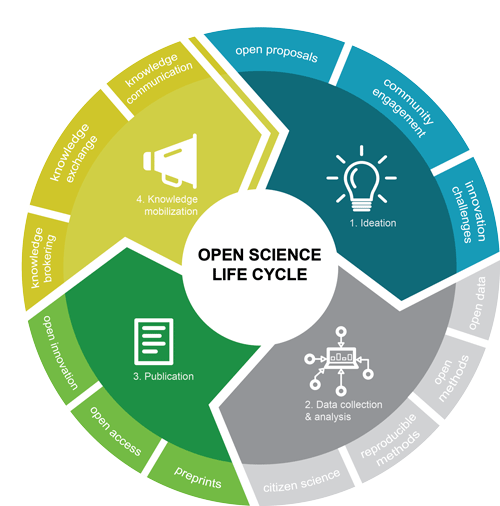
Unleashing the Potential: The Transformative Outputs of Open Science
Unleashing the Potential: The Transformative Outputs of Open Science https://opusproject.eu/wp-content/uploads/2023/07/OpenScienceLifeCycle-500x506-1.png 500 506 Open and Universal Science (OPUS) Project Open and Universal Science (OPUS) Project https://opusproject.eu/wp-content/uploads/2023/07/OpenScienceLifeCycle-500x506-1.pngOpen Science, a paradigm that advocates for transparent, collaborative, and accessible scientific research, has gained considerable momentum in recent years. By challenging the traditional closed model of science, open science initiatives aim to maximize the societal impact of research, foster innovation, and democratize knowledge. In this article, we will explore the various outputs of open science and how they are revolutionizing the scientific landscape.
One of the core principles of open science is ensuring that scientific research is freely available to anyone, anytime, anywhere. Open access publications eliminate the barriers of costly journal subscriptions, enabling researchers, students, policymakers, and the general public to access and build upon the latest scientific findings. This increased accessibility promotes collaboration, accelerates the pace of discovery, and enhances the potential for interdisciplinary research.
Open science encourages researchers to make their research process transparent and reproducible. Through the publication of detailed methodologies, data, and code, others can replicate and validate scientific findings. This commitment to transparency not only strengthens the rigor of scientific research but also allows for the identification of errors or flaws, ensuring the reliability and integrity of scientific knowledge.
The open science movement emphasizes the sharing and reuse of research data. By making data openly available, researchers can promote data-driven discoveries, facilitate new collaborations, and avoid unnecessary duplication of efforts. Open datasets enable scientists to address complex research questions, validate or challenge existing theories, and uncover new insights. Moreover, sharing data with the broader community allows for the development of innovative applications, tools, and technologies that can benefit society at large.
Open science fosters a culture of collaboration and collective intelligence. Online platforms and tools enable researchers worldwide to connect, share ideas, and work together on projects regardless of geographical boundaries. Collaborative research initiatives, such as citizen science, engage non-professional scientists and the public in the research process, harnessing their expertise, skills, and diverse perspectives. This collaboration leads to the generation of novel ideas, enhances interdisciplinary approaches, and broadens the impact of scientific research.
Open science encourages the exploration of alternative pathways to innovation and entrepreneurship. By providing unrestricted access to research findings and data, open science facilitates the development of new technologies, products, and services. Startups, industries, and entrepreneurs can leverage scientific knowledge and collaborate with researchers to create innovative solutions that address societal challenges. Open science also stimulates open innovation, where ideas and expertise are shared across sectors, leading to a more efficient and effective translation of scientific discoveries into practical applications.
Open science recognizes the importance of engaging the public in scientific research. By involving citizens in the research process, open science initiatives promote a greater understanding of science and its societal impact. Citizen science projects empower individuals to contribute to scientific research, gather data, and participate in decision-making processes. This engagement enhances public trust, encourages evidence-based policymaking, and ensures that research aligns with the needs and values of society.
The outputs of open science are transforming the way we conduct research, disseminate knowledge, and address global challenges. By embracing transparency, collaboration, and accessibility, open science initiatives are democratizing scientific knowledge, accelerating innovation, and promoting the well-being of society. As the open science movement continues to evolve, it holds immense promise for advancing scientific discovery, fostering interdisciplinary collaborations, and creating a more inclusive and sustainable future for all.
Headline picture: Government of Canada
- Posted In:
- Open Science News




